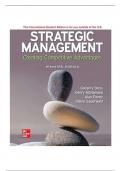Exam (elaborations)
Strategic Management Creating Competitive Advantages 11e By Gregory Dess, Gerry McNamara, Alan Eisner and Steve Sauerwald Instructor Solution Manual
- Course
- Institution
- Book
Strategic Management Creating Competitive Advantages 11e By Gregory Dess, Gerry McNamara, Alan Eisner and Steve Sauerwald Instructor Solution Manual
[Show more]



